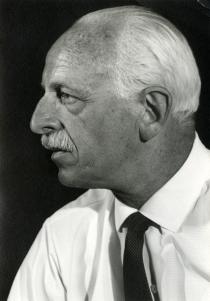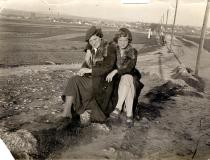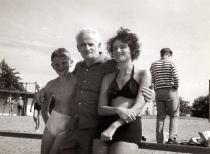This is my brother Artur Gringras. I think this photo was taken during the war in Fergana.
I met up with Artur in Asia, in Fergana. I even have a few photographs from Fergana, very small ones, but clear. Artur's children, Rysio and Lilka, were brought up in the care of our sister Ziuka, who afterwards left for Israel.
She was there with her husband, Chaskiel Majtek. Artur's wife [Anka] crossed the Soviet-German border several times, because until the outbreak of the war in 1941 you could travel like that.
But her last journey to Poland ended in her not being able to get back to Lwow. And she stayed in German territory, in Czestochowa, and as a result ended up in a munitions factory. She wasn't killed, she turned up after the war.
When Artur and his children came back to Poland from the USSR, the family came together again. And then that family emigrated to Israel in the 1950s, in 1951 or 1952. No, there were no problems emigrating then. If you had the opportunity it wasn't difficult.
Then Maurycy left with his family, with his wife Lola and little boy Henryk and the third, Leopold, went to Sweden, also with his wife and two daughters, one of whom, Inka, emigrated from Sweden to Israel and lives there to this day.
I think she's still alive. I'm not sure that they'd all have gone if it hadn't been for the Kielce pogrom.
In Israel Artur set himself up a good-sized photographic firm and worked as a photographer. He was assisted by my other brother Maurycy and his wife, because she was a photographer by trade too.
Artur came here, to Poland, before his death, when he was 84 or so in the mid-1980s.
In Wroclaw that time he got hold of a set of photographs that German soldiers often used to take during the war: photographs of Jews and Polish peasants.
Artur collected those photographs and I think he donated them to a museum in Jerusalem.

































































